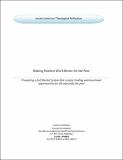Making Markets Work Better For The Poor
Abstract
The need to make markets work better for the poor has been a topic of concern, which is dominated by exclusion to poor people’s participation in economic growth. Studies have shown that the market reforms were meant to put the private sector at the center stage of economic activities and to be the engine of growth and poverty reduction. But to what extent can the market system be enhanced to ensure inclusive economic growth that accommodates poor people’s participation in the market system and thus reduces poverty and unemployment. Here we identify and address obstacles to poor people’s participation in economic activities thereby promoting inclusive economic growth. The study was both investigative and exploratory. We used data from Focus Group Discussions guides for Micro and Small Entrepreneurs (MSEs), structured questionnaires for other Civil Society Organisations and Government Ministries and reviewed relevant documents. The processing of data was done manually. Smallholder farmers and SMEs were found to not have easy access to the physical market infrastructures and credit. Despite the general policy framework for crop marketing not being complex, it has not helped smallholder farmers much due to government controlled pricing of the main impediments. Women face a lot of challenges such as lack of access to agriculture land and inputs. Our findings indicate that market reforms have not fully benefited the poor, Medium and Macro companies have exploited the poor by purchasing their goods and reselling them. Unless government invests heavily in feeder roads, bridges and market infrastructures, physical access to the markets will remain a pipe dream. Access to financial resources for MSEs and smallholder farmers is limited and the status quo will remain the same until government develops financing programmes and policies that will specifically target these groups.
Description
This study on making markets work better for the poor is opportune for Zambia as it marks the beginning of a series of further studies on the subject. Even though the constraints were multiple, JCTR has boldly taken the step to start investigating and examining issues on making markets work better for the poor so as to stimulate debate and further studies that will produce evidence based policy options for the poor.
